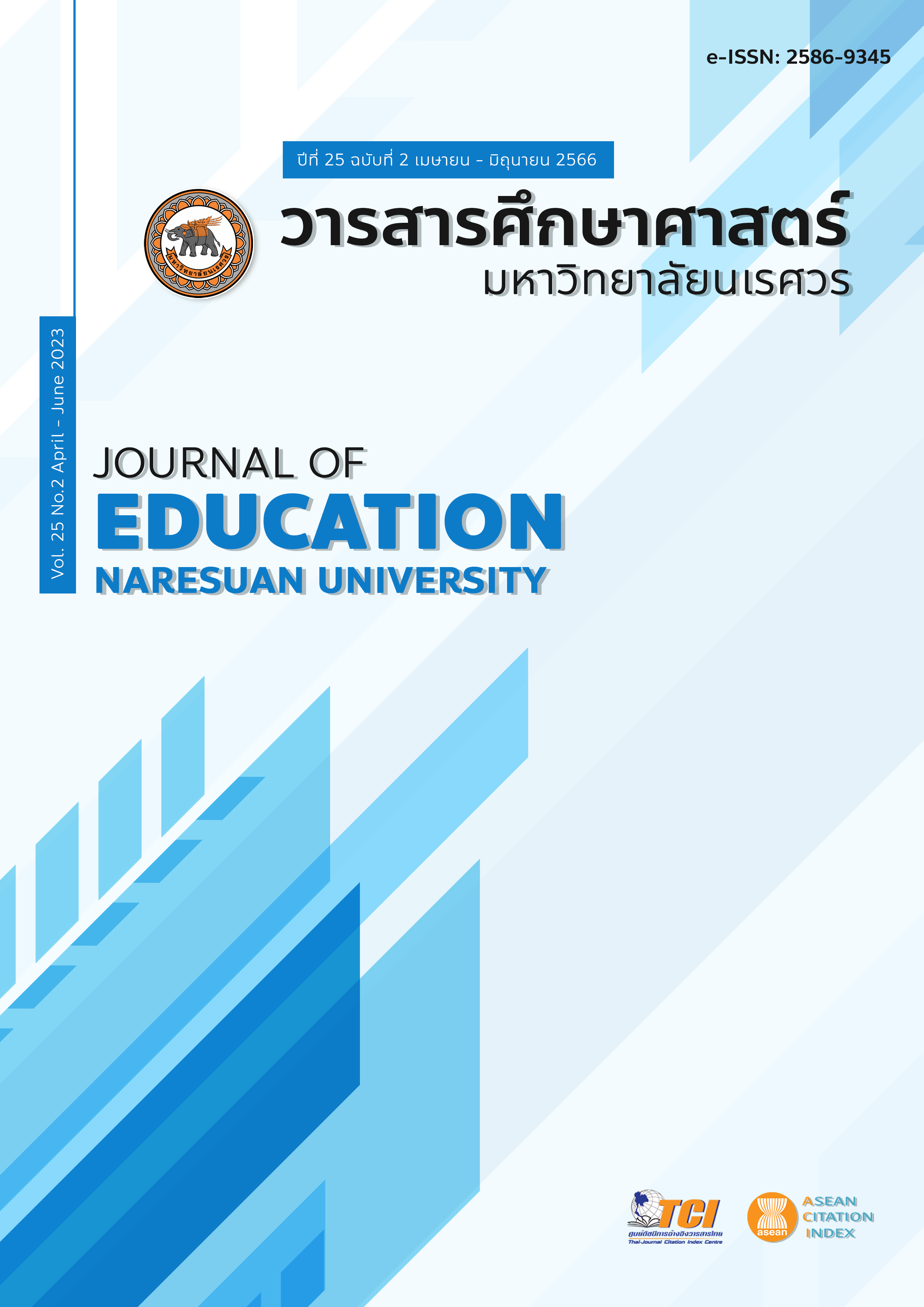A CREATIVE LEADERSHIP DEVELOPMENT MODEL FOR ADMINISTRATORS OF SECONDARY SCHOOLS UNDER OFFICE OF THE BASIC EDUCATION COMMISSION รูปแบบการพัฒนาภาวะผู้นำเชิงสร้างสรรค์ของผู้บริหารโรงเรียนมัธยมศึกษา สังกัดสำนักงานคณะกรรมการการศึกษาขั้นพื้นฐาน
Main Article Content
Abstract
This research aimed to establish a creative leadership development model of secondary school administrators under the Office of the Basic Education Commission. The research procedure followed three steps: 1) to study the creative leadership traits that affect school effectiveness and development guidelines by asking the opinions of high school administrators and interviewing experts, 2) to create and validate model by focus group discussion of experts, and 3) to evaluate a model by asking the opinions of the high school administrators. The research findings were as follows:
1. The creative leadership characteristics of all high school administrators had a positive influence on the effectiveness of schools including operations to the goal, motivation, problem-solving ability, vision, imagination and flexible thinking, as well as development guidelines based on the curriculum and creative leadership development manual.
2. The model consisted of; 1) input comprising a curriculum and creative leadership development manual, 2) process covering the 70-20-10 learning management principles, 3) output comprising that school administrators with creative leadership characteristics, 4) outcome or the quality of the school administration process and management, and 5) feedback or development results according to the outcome of the curriculum and creative leadership development manual.
3. The model evaluation results showed that the model was rated high level in terms of feasibility and the highest for utilization.
Article Details

This work is licensed under a Creative Commons Attribution-NonCommercial-NoDerivatives 4.0 International License.
The owner of the article does not copy or violate any of its copyright. If any copyright infringement occurs or prosecution, in any case, the Editorial Board is not involved in all the rights to the owner of the article to be performed.
References
Amdonkoy, S. (2013). Role of school administrators in the 21st century. Humanities and Social Sciences Journal of Pibulsongkram Rajabhat University, 7(1), 1-8. [in Thai]
Arkkarajan, R. (2017). A model for developing creative leadership for primary school teachers under the Office of the Basic Education Commission in the Upper Northeast Region (Doctoral dissertation). Sakon Nakhon: Sakon Nakhon Rajabhat University. [in Thai]
Dubrin, A. J. (2010). Principles of Leadership (6th ed.). Canada: South-Western Cengage Learning.
Faidee, R. (2016). Developing work by giving feedback by peer. PULINET Journal, 4(2), 174-181. [in Thai]
Gaze, A. (2016). Preparing school leaders: 21st century skills. Retrieved January 5, 2019 from http://principal.ca/documents/InternationalSymposiumWhitePaper-OPC
Kotter, J. P. (1996). Leading change. Brighton, MA: Harvard Business Publishing.
Lunsamlong, P. (2017). Development of a creative leadership model of administrators of basic educational institutions under Nakhon Ratchasima Primary Educational Service Area Office (Doctoral dissertation). Bangkok: North Bangkok University. [in Thai]
Ministry of Education. (2018). Educational benchmark of basic education level B.E. 2561 (2018). Retrieved January 5, 2019, form http://www.ratchakitcha.soc.go.th [in Thai]
National Association of Secondary School Principals (NASSP). (2013). Breaking ranks: 10 skills for successful school leaders. Retrieved January 5, 2019, from https://www.nassp.org/Content/158/BR_tenskillsExSum.pdf
Office of the Education Council. (2017). Developing guidelines for entering the position of school director. Bangkok: Prikwarn Graphic. [in Thai]
Office of the National Economics and Social Development Council. (2020). The Twelfth National Economic and Social Development Plan (2017-2021). Retrieved October 10, 2020, from http://www.nesdb.go.th/ewt_dl_link.php?nid=6422 [in Thai]
Paopan, C. (2016). Fundamental Concepts and Theories for being Leaders of School Administrators in the 21st century. Journal of Educational Administration, 12(1), 1-9. [in Thai]
People Value Organization. (2020). What is 70:20:10 theory? Retrieved May 18, 2019, form https://www.peoplevalue.co.th/content/9179
Piempratom, A. (2010). Giving and receiving feedback affecting employee performance: A case study of The Siam Cement (Kaeng Khoi) Co., Ltd (Master thesis). Bangkok: National Institute of Development Administration. [in Thai]
Pirom, W. (2016). Causal factors affecting effectiveness of educational institutions in the upper north region of Thailand (Doctoral dissertation). Chonburi: Burapha University. [in Thai]
Ratnatilaka Na Bhuket, P. (2009). Organization and management. Nonthaburi: Think Beyond Book. [in Thai]
Rattanagosum, J. (2018). Development of a creative leadership model of teachers in schools under Sakon Nakhon Primary Educational Service Area Office 3 (Master thesis). Sakon Nakhon: Sakon Nakhon Rajabhat University. [in Thai]
Sansuk, C. (2014). Antecedents and consequence of strategic leadership capabilities of higher education institute in Thailand. Journal of the Society of Researchers, 19(1), 34-46. [in Thai]
Sinrarat, P. (2011). Creative productive leaders: New paradigms and new educational leaders. Bangkok: Chulalongkorn University Press. [in Thai]
Stoll, L., & Temperley, J. (2009). Creative leadership: a challenge of our times. School Leadership & Management, 29(1), 65-78. https://doi.org/10.1080/13632430802646404
Vanichvasin, P. (2017). Leadership development: Theories, best practices and case study. Bangkok: Panyachon Publishing. [in Thai]
Weigel, R. A. (2012). School leadership skill development (Doctoral dissertation). Michigan:
Eastern Michigan University.
Worachin, T. (2016). Creative leadership development model of school administrators under the Office of the Secondary Education Service Area 24 (Doctoral dissertation). Maha Sarakham: Rajabhat Maha Sarakham University. [in Thai]


